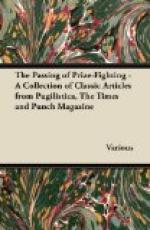Mrs. M. You may well be. But allowance must be made for the misapplied energy of our ancestors. If the Flappers excite our disgust, their subsequent treatment moves our commiseration, since the Sumptuary and Disciplinary Laws passed by the House of Ladies dealt in drastic fashion with the offences which I have described. As a matter of fact many Flappers grew up into excellent and patriotic women. I remember my grandmother saying to me once, “When I was sixteen I had a voice like a cockatoo and the manners of a monkey,” but nothing could have been more discreet or sedate than her deportment in old age.
Richard. Did the Flappers speak English?
Mrs. M. Presumably; but, judging from the records of their dialect which have come down to us, their speech was made up of a succession of squeals rather than of articulate words, and has so far defied the efforts of modern philologists. Indeed speech seems to have been almost at a discount, owing to the immense popularity of the moving picture play, then in its infancy and as yet unaccompanied by mechanical reproduction of the voices of the actors. Indeed at one time it was said that there were only three adjectives in use in Flapper society—“ripping,” “rotten” and “top-hole,” I think they were.
George. What stupid words! I wish they could have heard some of papa’s adjectives.
Mrs. M. Your father, my dear, has a copious and picturesque vocabulary, but phrases which are pardonable in moments of expansion in a person of mature years are not always suitable for juveniles.
* * * * *
THE TRANSGRESSOR.
I was walking painfully along a lonely road towing my three-thousand-guinea ten-cylinder twelve-seater. According to Regulation 777 X, both brakes were on. My overcoat collar was turned up to protect my sensitive skin from a blasting easterly gale, and through the twilight I was able to see but a few yards ahead. I had a blister on my heel. Somewhere, many miles to the eastward, lay my destination. Suddenly two gigantic forms emerged from the hedgerow and laid each a gigantic paw upon my shoulders. A gruff voice barked accusingly in my ear.
“You are the owner of a motorcar?”
Was it any use denying the fact? I thought not.
“Yes,” I replied humbly, “I am.”
“Have you the permit which allows you to possess this?” He waved towards the stagnant ’bus.
“I have.”
“Have you the licence which allows you to take it upon the high road?”
With frozen fingers I held it out to him. He moved to the back of the car, unscrewed the entrance to the petrol tank and applied his nose to the aperture. After three official sniffs he turned upon me aggressively.
“There is an undeniable odour of petroleum. How do you account for that?”
“Sir,” I replied, “last week my little son had his knockabout suit dry-cleaned in Perthshire by the petrol-substitute process. This morning he climbed upon the back of the car to see whether his Silver Campine had laid an egg in the hood.”




